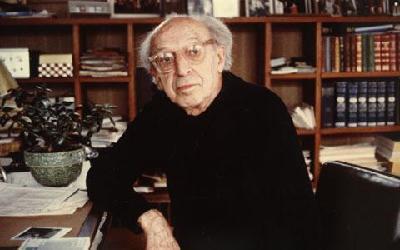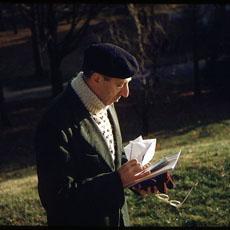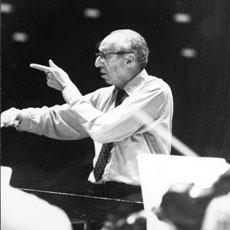
STEVE EMBER: I'm Steve Ember.
BARBARA KLEIN: And I'm Barbara Klein with People in America in VOA Special English. Today we tell about Aaron Copland, one of America's best modern music composers.
(MUSIC)
STEVE EMBER: Aaron Copland wrote many kinds of music. He wrote music for the orchestra, piano, and voice. He wrote music for plays, movies and dance. Copland also was a conductor, pianist, speaker, teacher and author.
Music critics say Copland taught Americans about themselves through his music. He used parts of many old traditional American folk songs in his work. He was influenced to do this after studying music in France. He said that composers there had a very French way of writing music. He said Americans had nothing like that in this country. So he decided to compose music that was truly American.

BARBARA KLEIN: Aaron Copland was born in 1900 in Brooklyn, New York. He was the youngest of five children. His parents had come to the United States from eastern Europe. They owned a store in Brooklyn. Aaron began playing the piano when he was a young child. He wrote his first song for his mother when he was eight years old. His dreams of becoming a composer began when he was young.
When he was 16, he urged his parents to let him study composing with Rubin Goldmark. Goldmark had taught the composer George Gershwin.
STEVE EMBER: When he was in his early 20s, Copland went to Paris where he studied music with Nadia Boulanger. She was one of the most important music teachers of the time. He returned to New York in 1924.
The famous conductor of the Boston Symphony Orchestra, Serge Koussevitzky, learned about Copland's music. Koussevitzky led the orchestra for the first performance of Copland's early work, "Music for the Theater," in 1925. Koussevitzky also conducted Copland's "Concerto for Piano and Orchestra" in 1927. This work was unusual because Copland used ideas from jazz music in his concerto.
BARBARA KLEIN: Copland later wrote the music for two ballets about the American West. One was about the life of a famous gunfighter called Billy the Kid. Copland used music from American cowboy songs in this work. This piece from "Billy the Kid: Ballet Suite" is called "Street in a Frontier Town."
(MUSIC)

STEVE EMBER: In 1942, the conductor Andre Kostelanetz asked Copland to write music about a great American, Abraham Lincoln. Copland wrote "A Lincoln Portrait" to honor America's 16th president. Copland's music included parts of American folk songs and songs popular during the American Civil War. He added words from President Lincoln's speeches and letters.
"A Lincoln Portrait" has been performed many times in America. Many famous people have done the speaking part. Eleanor Roosevelt, the wife of President Franklin Roosevelt, was one of them. Here, actor James Earl Jones performs in Copland's "A Lincoln Portrait."
(MUSIC)
BARBARA KLEIN: Also in 1942, the music director of the Cincinnati Symphony Orchestra asked 18 composers to write music expressing love for America. For the competition, Copland composed "Fanfare for the Common Man." This music is played in America during many national events, including some presidential inaugurations.
(MUSIC)
STEVE EMBER: Experts say "Fanfare for the Common Man" was an example of Copland's change in direction during the 1940s. He began writing music that was more easily understood and more popular. Copland wrote about this in 1941 in his book, "Our New Music." He wrote that a whole new public for music had developed as a result of the popularity of the radio and record player. He said that there was no reason to continue writing music as if these devices did not exist. So he decided to write music in a simpler way.
BARBARA KLEIN: Copland spread his ideas about music in other ways. He taught at the New School for Social Research in New York City and at Harvard University in Cambridge, Massachusetts. One of the many awards he received was the Pulitzer Prize. He won it in 1945 for his famous music for a ballet called "Appalachian Spring." It is one of his most popular works. The last part of the ballet is based on a traditional song, "A Gift to be Simple."
(MUSIC)

STEVE EMBER: Copland also wrote music for several major motion pictures. He won an Academy Award in 1950 for composing the music for the film, "The Heiress." Then, he began experimenting with what is called a 12-tone system of composing. His music no longer was as easy to understand, or as popular.
Copland stopped composing at the end of the 1960s. Yet he continued to be active as a conductor and speaker. In 1982, Queens College of the City University of New York established the Aaron Copland School of Music.
BARBARA KLEIN: Copland was a strong supporter of liberal ideas. In the early 1950s, he and other famous writers, actors and intellectuals were accused of supporting communism. Public opinion changed, though. In 1964, President Lyndon Johnson presented him with the Presidential Medal of Freedom. It is America's highest award to civilians. Aaron Copland died in 1990 at the age of 90. But his music lives on.
(MUSIC)
STEVE EMBER: This Special English program was written by Shelley Gollust. It was produced by Lawan Davis. I'm Steve Ember.
BARBARA KLEIN: And I'm Barbara Klein. Join us again next week for another People in America program in VOA Special English.
concerto: a composition for an orchestra and one or more solo instruments, typically in three movements 協奏曲
Bridges revives his music career with new album
Jazz great George Shearing dies at 91
Leonard Bernstein, 1918-1990: musical great
Make beautiful music under the stars at Ravinia
(來源:VOA 編輯:崔旭燕)
